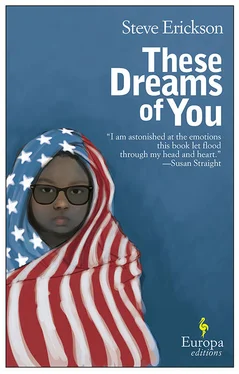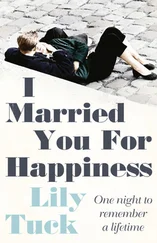“Just now?” he says.
“A moment ago.”
“The ‘maybe in different words’ part?”
“No. Before that. Sir,” she resumes heatedly, “you’ll need to notify the foreclosure department to make those arrangements.”
“Which arrangements?”
“Arrangements to get in the property. I can transfer you to that department, if you would like.”
“You don’t happen to know whore of babylon if the locks on the house have been changed, do you?” Zan says.
“What?”
“You don’t know if the locks on the house have been changed yet?”
She says, “You said something else.”
“Actually, I. . did I? I think this time it was in those words. Hey, listen,” he says, “I’m not sure what you think I said, but this call is from London so I should just phone again tomorrow, maybe, once we’re back? In the meantime I want to thank you and your fine institution for all the help and understanding you’ve given us over these many difficult months.”
He thinks the line has gone dead or he’s lost the connection when she answers quietly, “Yes, sir. You’re welcome, sir.”
On the flight, Viv sleeps and Parker plays a video game on a small screen in the seat in front of him. Watching him, Zan wonders, How long it will be before I know what my son feels about everything that’s happened? How long will it be before he knows? Will we talk about it before I die? He and his sister are going to lose me before they should have to and Zan feels worse about them than himself. Sheba refuses to take any Benadryl and Zan doesn’t force the issue; the girl says nothing, doesn’t make a sound. Sometimes she watches the small TV but mostly stares out the window.
From LAX, Zan calls the Añejo in the canyon and the family waits for Roberto to pick them up in his truck. The next morning Zan returns alone in Roberto’s truck to the house.
A sign reading BANK OWNED hangs in front and the yard is overgrown. Viv’s car that was in the driveway has been towed. Zan’s is parked in the lower part of the backyard; the older woman who lives next door tells him she claimed the car was hers so the bank wouldn’t take it. “I appreciate it,” Zan tells her. “Fuck them,” says the old woman. Down the steep drive, Zan tries to affect the stroll of the not too mortally humiliated.
The lock on the front door has been changed. Zan goes around to the back and gets down on the ground and pokes his head through what used to be Piranha’s door. The house smells. He pulls out his head and grabs the dog door with both hands and rips it free from the larger door. Positioned on the ground again, on his back he can reach just far enough inside to turn the lock of the door, hoping it’s not bolted. Once more he withdraws and, catching his breath, opens the back door and walks in.
None of the Nordhocs’ possessions inside the house have been moved. What would they do, Zan wonders, pile it all out on the street? When he walks from the kitchen to the dining room, he sees something dart out of the corner of his eye; he hears scampering around him. He can talk himself into some sense of satisfaction about the rats taking over the house but still he’s glad none of the family is here to see it. Emotion wells up in him but, he thinks, I’m not going to shed one fucking tear over this fucking house.
He spends the day loading as much as he can into Roberto’s truck and then his own car. Literature and volumes of history, music, family memorabilia, Viv’s art and photographs, copies of Zan’s four novels, files that include accounts, life insurance policies, past tax records, the kids’ birth certificates and social security numbers. He grabs blankets and a small table and the rocking chair from the family room. He remembers the night that the fire in the canyon swept close enough, and Zan and Viv prepared to evacuate, loading up the car — so they’ve already prioritized things. In their minds, they’ve been on the verge of escaping for years.
He returns Roberto’s truck to the Añejo. “I don’t know if I can unpack it tonight,” Zan whispers. The men stand outside in back of the bar, next to the small shed from which Zan broadcasts his radio show. “We can do it tomorrow,” says Roberto. “I’ll help.”
“Thanks.”
“I would have helped you move it all out.”
“I didn’t want anyone else to see the house.”
Roberto says, “We’ve missed your music.”
“I made playlists in my head,” says Zan, “in London. But I don’t think you want to hear them.”
Exhausted, Zan drives his car to the old railroad bridge down the road where the rest of the family waits for him. In the gentle autumn night, with the blankets from the house, Viv makes a place to sleep. “Roberto sent shrimp enchiladas from the bar,” Zan says, laying out the food. “Rice and refried beans.”
Parker says, “I like black beans.”
“I can’t keep up with you,” Zan says, “I thought you liked refried beans. Your taste changes all the time.”
Viv calls, “Sheba, come eat,” but the girl doesn’t answer so everyone else eats. Zan remembers that the supposedly haunted railroad bridge used to freak out Parker and he suppresses the impulse to talk about devil rites and Indian ghosts, which ordinarily Parker would find entertaining. It would be like talking about tsunamis while driving Pacific Coast Highway. “Are you going to be all right here?” he says to the boy.
“What do you mean?” Parker says. “Why wouldn’t I be?”
“No reason.”
“Isn’t this bridge supposed to be haunted?”
“By the ghosts of Indians. It’s O.K., they’re on our side.”
“How do you know?”
“I promise you, they are.”
“How long are we staying?” the boy says.
“Not long. We’ll work out something soon, I promise.”
“You promise, you promise,” a bit scornfully. “Once you promised about the house, too.”
“I know I did,” Zan quietly replies. “And I did everything I could to keep the house and keep that promise. It doesn’t mean I won’t find a way to keep the next one.”
Parker nods. “O.K., Dad.”
Viv says, “If the creek were up, we could sleep to the sound of it beneath us.”
“Isn’t that the creek?” says Zan, listening.
“I hear it too,” says Parker, “it’s not the creek. It sounds like a radio far away,” and all of them turn toward the end of the old bridge and gaze up at the apex of its frame where the four-year-old girl is perched, staring out at the mouth of the canyon and whatever should roll in from the ocean.
Zan walks over and looks up into the rafters. “Sheba,” he says, “come down. You could fall. There’s food,” indicating the enchiladas. The girl glances at him, then back toward the sea, then climbs down the ladder.
As she sits eating her enchilada, Viv says to her, with what she hopes is just the right degree of bluntness so as to arouse a response, “Would you rather be called something other than Sheba?”
“What?” the girl says.
“Would you rather be called someth—”
“But what .”
“Whatever feels like it’s your name.”
The girl thinks. “Isn’t Sheba my name?”
Viv says, “Yes. But you can always change your mind later.”
“I can?”
“Yes.”
“Maybe later.”
“O.K.”
“When I grow up to be who I am.”
“All right.”
Читать дальше











